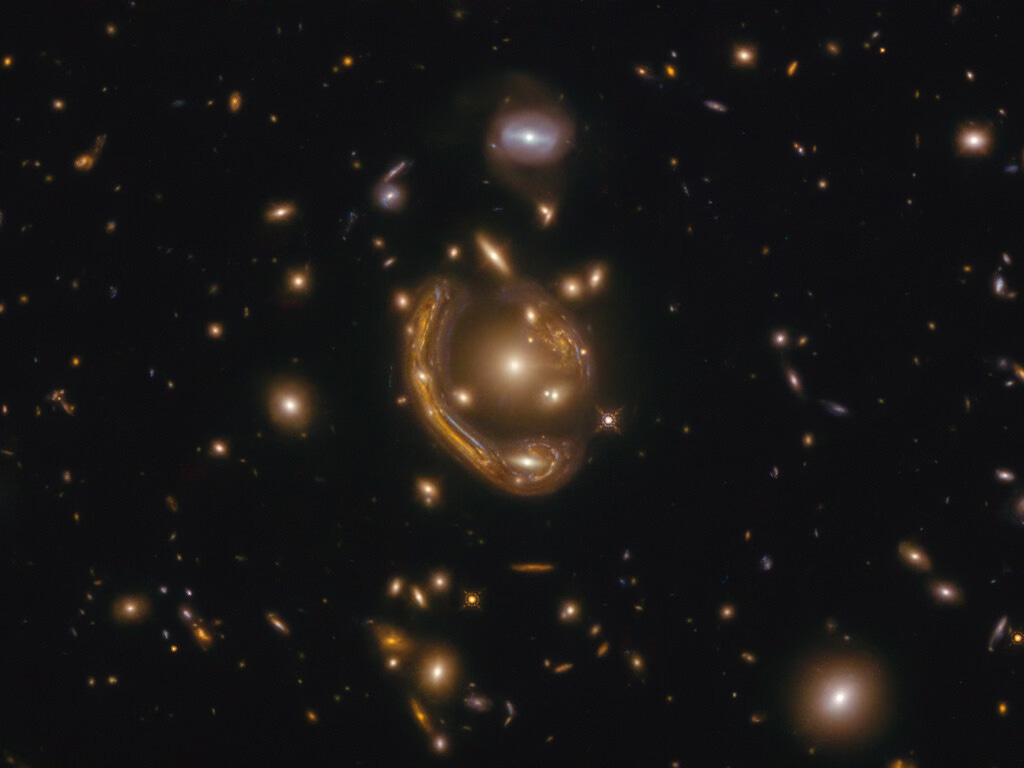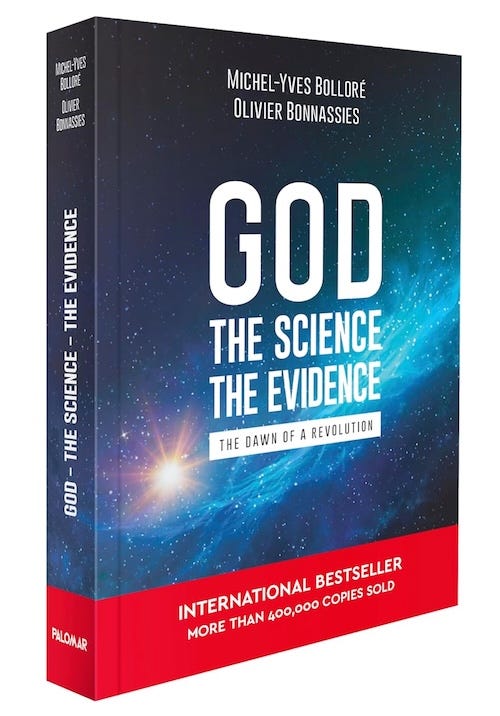Does Modern Science Point to God?
A new book makes a swing-for-the-fences case.

Einstein had made a mistake.
Alexander Friedmann, an unassuming thirty-three-year-old Russian mathematician, was sure of it. In 1922, he published a correction to Einstein’s general theory of relativity. He then mailed his article, along with a respectful note, to the renowned physicist.
Although dismissive at first, Einstein ultimately conceded that the young Russian’s calculations were correct. The implications were astonishing.
Like most physicists of his day, Einstein had been confident that the universe was static, neither growing nor contracting. Such a cosmos, religious skeptics comfortably assumed, had always existed. To ensure his relativity equations reflected this consensus, Einstein inserted a value that became known as the “cosmological constant.”
And therein lay his error. Friedmann’s correction to Einstein’s constant showed that the universe could, in fact, be expanding. And if that was the case, then the cosmos could have had a beginning. And if it had a beginning. . .
God, the Science, the Evidence by Michel-Yves Bolloré and Olivier Bonassies makes its English-language debut today. Having already sold over 400,000 copies in French, Spanish, and Italian, this sprawling book covers even more ground than its bold title suggests. Approximately half of its 562 pages are dedicated to “Evidence Within the Sciences.” For the sake of focus, I’ll mostly limit this review to that part. It’s followed by another section, roughly 150 pages, that draws on evidence outside science, including philosophy, accounts of miracles, and Christian apologetics, or reasoned arguments for the faith. A handful of introductions, conclusions, and appendices fill out the remainder of the book.
This breadth allows for an extraordinary range of topics, historical whistle-stops, and arguments. Interested in a thriller-style account of the persecution of Soviet physicists who claimed the universe had a beginning? It’s here. Eager for a takedown of the pseudo-scientific theory that we’re living in a multiverse? Included. Ever pondered the slim odds of the Jewish people surviving millennia of persecution and displacement? That’s on offer too.
But how effective is such a vast scope? Like a sandwich piled with every conceivable ingredient, does it work? Can so many flavors possibly harmonize?
The answer will depend on the reader’s taste buds. Personally, I’ll admit a soft spot for ambitious, grandiose books. Even so, I appreciated the authors’ note that the chapters work independently and can be read in any order. Most, I suspect, will find that God, the Science, the Evidence is best approached like a buffet line. You can start with what you find particularly appetizing, and grab another plate when you’re hungry again. You won’t soon run out of interesting dishes to choose from.

To great effect, the book captures the unexpected collisions between human scheming and scientific breakthrough. I, for one, had no idea that Karl Marx’s collaborator Friedrich Engels had raged against the second law of thermodynamics. But increasing entropy, or disorder, signaled a changing universe. And as Engels saw it, a changing cosmos suggested one with a beginning. And a beginning implied a Creator. Scientific discoveries that even hinted at such a possibility were therefore bitterly opposed by Engels, Marx, and their atheistic disciples.
Here, authors Bolloré and Bonassies offer a fascinating glimpse into a world before the hyper-specialization of modern thought. It’s a view of an era when great minds took seriously the connections between fields as varied as physics, philosophy, and politics. In such an atmosphere, scientific discoveries carried theological and even moral implications. As these emerge, readers are also reminded of evil’s potential to react fiercely against truth in any form.
To show this, the book turns to Alexander Friedmann, the Russian physicist who caught Einstein’s error. Friedmann was not a religious man. Nonetheless, he was bullied by the Soviet regime and pressured to bury his scientific insights. The mere implications of his calculations were too much for the paranoid Communists. Friedmann died, likely from illness, just a few years after his breakthrough. But many of his students continued to argue that the universe was, in fact, expanding. For this “crime,” some faced imprisonment and even death.
Thankfully, not all that God, the Science, the Evidence recounts is so grim. I found the section on the fine-tuning of the universe to be downright beautiful. It helped me better appreciate why some find science not just intellectually stimulating, but also emotionally compelling.
The logic of fine-tuning can be boiled down to this: the extremely precise clockwork of the universe implies a clock-maker. If the forces that hold atoms together were even slightly stronger or weaker, matter as we know it would fall apart. Meanwhile, if the gravitational force wasn’t "just so,” we’d be crushed. Yet scientists have no explanation for why these forces are. . .perfect. Some can’t help but describe them as “miraculous.”
Such evidence for fine-tuning would exist even if our universe were merely filled with space rocks. And yet we also have to account for the breathtaking complexity of life. Here, the book fittingly quotes Fred Hoyle, an astronomer whose own observations led him to abandon atheism.
The chance that higher life forms might have emerged [purely by accident] is comparable with the chance that a tornado sweeping through a junk-yard might assemble a Boeing 747 from the materials therein.1
God, the Science, the Evidence is chock full of compelling quotes. Faced with the grandeur of the cosmos, even unbelievers express awe and wonder. Consider this quotation, also found in the book, by the physicist and atheist Stephen Hawking.
The laws of science, as we know them at present, contain many fundamental numbers, like the size of the electric charge of the electron and the ratio of the masses of the proton and the electron. . .The remarkable fact is that the values of these numbers seem to have been very finely adjusted to make possible the development of life.2
For some, such quotes alone will make this book worth owning. I’m thinking particularly of Christians with a passion for science or those who enjoy engaging scientifically-minded skeptics.
That’s not to suggest the book will please all believers. Young-earth creationists, in particular, will find its reliance on the timeframes of mainstream science unhelpful. Even Christians outside of the young-earth camp may not agree with some of the authors’ assertions about the book of Genesis.
Similarly, Protestants may be surprised to discover the book recounts an alleged miraculous appearance of Mary, the mother of Jesus. This event, which took place in Fátima, Portugal in 1917, is regarded by many Roman Catholics as a modern-day miracle. Yet it’s a curious inclusion in a book that, at the outset, suggested it would steer clear of any one particular religion’s understanding of God. In the book’s second half, it becomes clear that the authors have opted to include overtly Christian arguments. Even so, this chapter, pointing to one particular tradition, stands out.
Again, I liken the book to a buffet line. Christians who are comfortable passing by some of the dishes will still find a lot to savor.
But what about the skeptic? Does God, the Science, the Evidence possess that kind of persuasive power? I’m probably not the best person to judge that. But I do think an atheist or agnostic who engages the book seriously will experience quite a few “I never thought of that” moments.
Belief, of course, ultimately requires more than that. Hebrews 11:1 describes faith as “the assurance of things hoped for, the conviction of things not seen.” Ultimately, God’s existence can’t be proven from the physical universe any more than the historical fact of Jesus’ resurrection can be proven from Luke’s gospel account.
But Scripture also reminds us that what is seen offers insight into the unseen. The first chapter of the Apostle Paul’s letter to the Romans makes this plain.
For what can be known about God is plain to [unbelievers], because God has shown it to them. For his invisible attributes, namely his eternal power and divine nature, have been clearly perceived, ever since the creation of the world, in the things that have been made. So they are without excuse.
The authors of God, the Science, the Evidence have made a dogged effort to relieve the unbelieving of their excuses. Meanwhile, they offer the faithful an optimistic thesis, namely that modern science can, in fact, help point the world to faith.
Maybe the book’s eclectic nature will even prove to be a strength. To its credit, it’s refreshingly free of the safe, focus-group-approved quality found in so many contemporary Christian books.
Time will tell. In any case, this book serves as a great reminder. It offers the bold assurance that believers can stand confident in what can be known about God and his creation.
And it invites us to marvel at what cannot.
From “Hoyle on Evolution,” Nature 294 (12 November 1981): 105.
Stephen Hawking, A Brief History of Time (New York: Bantam Books, 1998), 125.



I think I need to get this book for my scientifically minded atheist family members! Thanks for the review 🙂